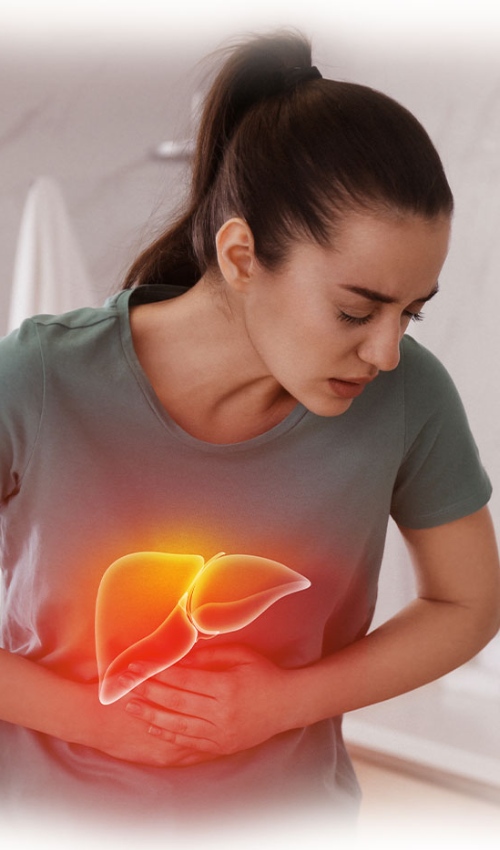AYURVEDIC TREATMENT FOR LIVER DISORDERS IN KERALA
One of the biggest and most intricate organs in the body, the liver carries out crucial processes like protein synthesis, detoxification, and blood sugar regulation. There are many different signs and illnesses that can result from the liver not working properly. This is a result of the hazardous compounds being produced by a disrupted metabolism. The inflow and outflow to the cells are blocked as a result of these undesirable metabolites adhering to the fat strands. In Kerala liver disorders are treating effectively, starting with Detoxification due to the pathophysiology mentioned. Pitta derangement will also occur as a result of liver dysfunction. Virechana (Medicine-induced purgation) is the best Panchakarma technique for Pitta detox. However, if we only purge with some oral medication, it won’t be enough to get rid of the poisonous compounds that are attached to the fat in the body. In order to start the fat metabolism, Snehapanam (Medicated Ghee Intake) is the initial step. Once you’ve reached a point of saturation, you should then stimulate the body with specific diets and outside treatments. Only purgative drugs should be taken after that. Following purgation, a diet and a few rejuvenating procedures will be used together with medications that preserve the liver.

WHAT ARE LIVER DISORDERS?
Liver disease, or hepatic disease, constitutes a diverse range of illnesses affecting the liver due to various factors, including viruses, genetics, medications, alcohol, or toxins. Cirrhosis, characterized by scarring, is a serious long-term consequence that compromises liver function and can progress to liver failure or cancer if left untreated.
Hepatitis, an inflammation of the liver, can stem from exposure to pollutants, excessive alcohol, infection, or immunological disorders. The most common form, viral hepatitis, has three main types. Hepatitis A is acute and usually resolves without treatment. Hepatitis B and C may lead to chronic infections, causing progressive damage. Early detection through screening is crucial.
Fatty liver disease involves the abnormal accumulation of fat in the liver, with two primary types: non-alcoholic fatty liver disease (NAFLD) and alcoholic steatohepatitis. NAFLD, unrelated to heavy alcohol use, includes simple fatty liver and non-alcoholic steatohepatitis (NASH), characterized by inflammation and liver cell destruction. Alcoholic steatohepatitis results from heavy alcohol use, progressing to alcoholic hepatitis and cirrhosis.
Other liver conditions include autoimmune hepatitis, primary biliary cirrhosis (PBC), primary sclerosing cholangitis, hemochromatosis, Wilson’s disease, and alpha-1 antitrypsin deficiency. Liver cancers encompass primary hepatocellular carcinoma and secondary metastatic liver cancer. Symptoms often manifest in advanced stages, underscoring the importance of early detection, proper management with medications and surgery, and lifestyle adjustments to mitigate risks and alleviate symptoms. Cirrhosis significantly increases the likelihood of liver cancer, emphasizing the interconnectedness of liver disorders and their potential consequences.

LIVER DETOXIFICATION IN AYURVEDA
Significant liver problems can appear in many different ways and are a major cause for concern. In addition to hepatic failure, pitta derangement can also arise. The finest Panchakarma method for Pitta detox is virechana (medically induced purgation). To get rid of the toxic substances that are connected to the body’s fat, however, we must use more than only oral medication during purging. Snehapanam (Medicated Ghee Intake), which is the first stage, kicks off the fat metabolism. The body should then be stimulated with specialized foods and external therapies once you’ve reached a point of saturation. The only medication to take after that is purgative.

SIGNS & SYMPTOMS OF LIVER DISORDERS
A critical and frequently undetected medical condition is liver problems. They might range from minor liver inflammation to serious liver conditions like cirrhosis. Depending on the kind and severity of the ailment, symptoms of liver issues can vary, but frequent ones include persistent exhaustion, stomach pain and swelling, jaundice (yellowing of the skin, nails, and eyes), nausea and vomiting, loss of appetite, and a propensity to bruise easily. Other signs include swollen ankles and legs, pale stools, itching skin, and black urine.
But frequently the liver is severely damaged before any symptoms appear. As a result, it’s critical to routinely check the liver’s health with imaging exams and blood testing, especially in those who have risk factors like alcohol consumption or obesity.
CAUSES OF LIVER DISORDERS
There are several reasons of liver illness and damage. Severe viral and parasite infections are among those that might result in inflammation and impaired liver function. The viruses that cause liver damage can be spread through direct contact with an infected person, contaminated food or drink, blood or semen, or tainted objects. The most common types of liver infections are caused by hepatitis viruses, including those that cause hepatitis A, B, and C. Autoimmune disorders, in which the immune system targets particular body organs, can have an effect on the liver. For instance, autoimmune hepatitis, primary biliary cholangitis, and primary sclerosing cholangitis are examples of autoimmune liver illnesses. A defective gene that you either inherited from one of your parents or both of them can cause liver damage when certain substances build up in your liver. The following liver disorders have genetic roots: Alpha-1 antitrypsin deficiency, Wilson’s disease, and hemochromatosis. Liver diseases can be brought on by cancer and other growths such as liver adenoma, bile duct carcinoma, and cancer of the liver. Chronic alcohol misuse, fat buildup in the liver (non-alcoholic fatty liver disease), and several prescription or over-the-counter drugs are additional common causes of liver disease.
COMMON LIVER DISORDERS TREATED WITH AYURVEDA
Ayurveda emerges as a potent approach for early-stage liver conditions, notably Kamala (Hepatitis A & B) and Kumbhakamala (Ascites linked to liver damage). Employing specialized treatments and medications, Ayurveda goes beyond symptom relief to actively control disease progression and avert further organ damage. This holistic system prioritizes harmonizing the body, aiming not only for symptom management but also overall well-being enhancement. By addressing root causes and fostering balance, Ayurveda presents itself as a proactive and comprehensive strategy for managing liver health. Its focus on prevention and early intervention underscores its potential as a valuable alternative or complement to conventional medical approaches, offering a holistic perspective that aligns with the intricate nature of liver disorders in their initial stages.
WHEN TO SEE A DOCTOR?
Make a doctor’s visit right away if any unsettling persistent symptoms or indicators last for more than a month. You shouldn’t wait any longer than a few days to seek medical advice if you have severe abdominal pain that won’t go away.
BOOK APPOINTMENT























